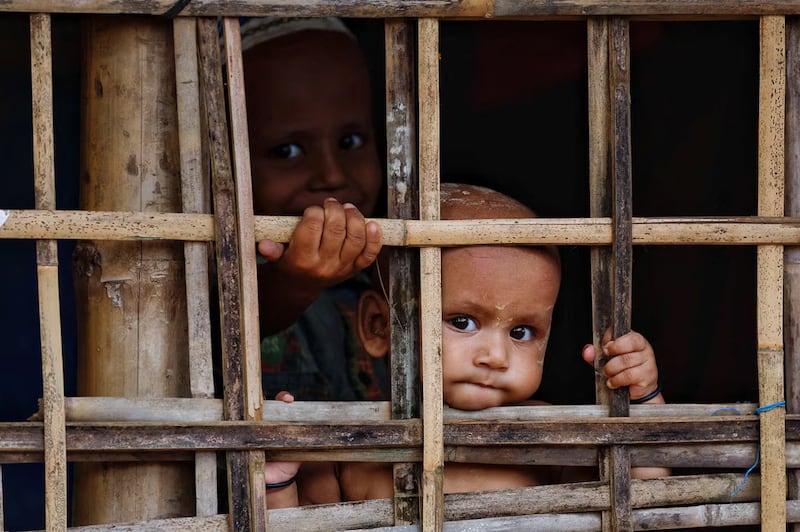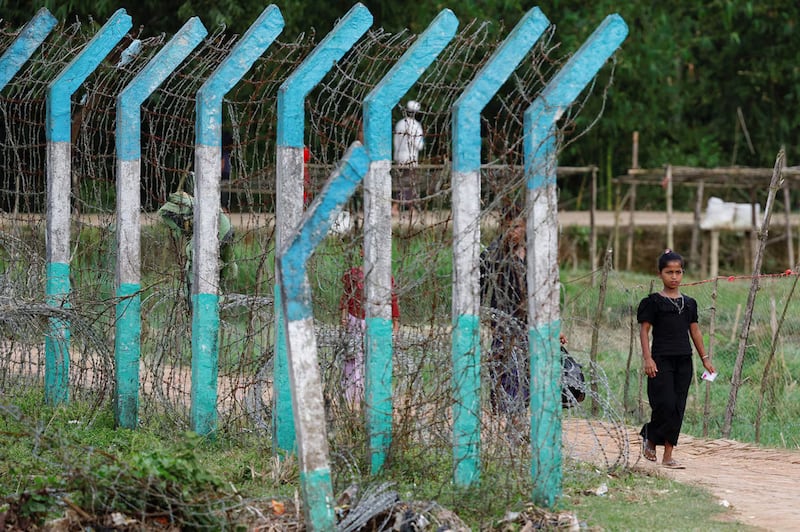Amnesty International researcher Joe Freeman recently traveled to Cox's Bazar, the district in Bangladesh along the border with western Myanmar's Rakhine state where thousands of ethnic Rohingya have taken refuge this year.
Members of the ethnic Muslim minority group joined about 1 million Rohingya already sheltering in camps in Cox’s Bazar, including the more than 700,000 who fled a military crackdown in August 2017 and crossed the border.
This year, Rohingya in Myanmar have found themselves caught in the crossfire between the military junta, which seized power in a 2021 coup d'etat, and the ethnic Arakan Army (AA), which is fighting for self-determination in Rakhine state. Both sides have been accused of killing Rohingya, with AA fighters blamed for attacking people accused of supporting junta forces.
Radio Free Asia, a news service affiliated with BenarNews, interviewed Freeman last week about his late September trip.
RFA: You've just come back from a trip to Cox's Bazar, and it seems there was very much a particular group from a particular area fleeing a particular conflict. Who were they?
Joe Freeman: The reason I went there was to speak to people who had fled armed conflict in Rakhine state, which has, in the past year, really intensified because the Arakan Army there has launched unprecedented operations against the Myanmar military. That has led to a conflict situation where the Rohingya are trapped in the middle, and they're being pushed out of their homes. They're being killed, whether in airstrikes by the Myanmar military or, according to people I spoke to, indiscriminate attacks by the Arakan Army or extrajudicial killings of civilians in the conflict zone.
In 2017, it was the military who were persecuting the Rohingya. Now it’s like they have two foes. They’re being persecuted by the military. That still hasn’t really ended. They’re being forcibly conscripted and forced to fight for the military against the Arakan Army, and that’s putting them, obviously, at risk.

But they’re also being caught in the conflict that the Arakan Army has launched against the military. And so, it’s like the situation for them has gotten worse since 2017. At least then they felt like maybe this would all get sorted out in some way and they could return home. The distinct contrast now is that there is a real hopelessness that they will ever be able to return to their homeland.
RFA: Over 1 million people are already in Cox's Bazar. The authorities have had a hard time dealing with those already there, these new arrivals. Are they being registered? Are they being looked after? Can Bangladesh cope?
JF: Well, this is a huge problem for the people who have arrived. Obviously, Bangladesh has been dealing with this situation for a long time. Rohingya have been persecuted for decades and have sought refuge in Bangladesh for decades – 2017 just being the most kind of extreme version of that. So from the Bangladesh perspective, they have said, "We can't accommodate anymore refugees."
RELATED STORIES
[ Terror in Rohingya camp as boys kidnapped to fight in MyanmarOpens in new window ]
[ Rohingya face ‘gravest threats since 2017’ as fighting rages in western MyanmarOpens in new window ]
[ Attacks against Rohingya now ‘worse than in 2017’Opens in new window ]
But from our perspective, these are people fleeing some of the worst violence anyone could ever experience. They’ve lost relatives, husbands, spouses, children, grandchildren, in some cases, and now they’re in Bangladesh, and they don’t have any support. So we really are urging the government to work with UNHCR – the UN’s refugee agency – to get these newer people registered.
By getting registered, they can access certain things, certain basic aid. But without that, they’re really reliant on just their relatives. Some people we spoke to, their relatives were sharing food with them, sharing their homes with them, sharing clothes with them. So it’s a very desperate situation. Even some people we spoke to were really hungry. They’re not eating enough during the day because there just isn’t enough food.

RFA: So what's stopping them from getting registered?
JF: Right now, UNHCR is not able to register because Bangladesh's position is that they can't take anymore. When you register someone, that means they can live there for the foreseeable future. But not many countries are stepping up to offer third country resettlement.
RFA: So, Bangladesh isn't prepared to register them. It doesn't want them there. Are they sending them back? And if they are, to what?
JF: Yes, they are. Even I think, Muhammad Yunus, who is head of Bangladesh's interim government, has acknowledged that sending them back would mean sending them back to their death. People we spoke to, some of them had arrived, having fled unimaginable violence, and they made it to Bangladesh, and they were detained by border guards and then sent back to Myanmar, which is a violation of international law.
So we’re also calling on Bangladesh to stop that now. They have disputed that that’s what they’re doing. They say that they’re intercepting people who are trying to cross their border. But they have a responsibility to give those people refuge.

